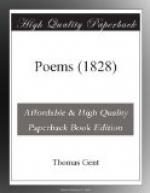Did those, thy benefits had placed on high,
Who revell’d still in wealth’s
meridian ray;
Did those impatient to thy succour fly,
Anxious the debt of gratitude to pay?
Or, thy fall’n fortunes coldly whispering round,
Scowl’d they aloof in that disastrous
hour?
On keen Misfortune’s agonizing wound
Did foul Ingratitude her poisons pour?
If thy distress such aggravation knew,
Thy first reverse could such perdition
wait;
Well might Despair thy generous heart subdue,
And Desperation close the scene of fate.
Yet while Distraction urged her purpose dire,
Rose not, at Nature’s interposed
command,
The sacred claims of Brother, Husband, Sire,
To win the weapon from thy lifted hand?
Ah, yes! and ere that agony was o’er,
Ere yet thy soul its last resolve embraced,
What pangs could equal those thy breast that tore,
Thy breast with Nature’s tenderest
feelings graced?
Those only which, at thy accomplish’d fate,
That home display’d, thy smiles
were wont to bless;
That dreadful scene what language can relate,
What words describe that exquisite distress.
The Muse recedes—in Grief’s domestic
scene
Th’ intrusive gaze prophanes the
tears that flow:
Drop, Pity! there thy hallowed veil between;
Guard, Silence! there the sacredness of
woe.
Nor let the sectarist, whose faith austere
Pretends alone to point th’ eternal
road;
Proud of his creed, pronounce with voice severe,
All else excluded from the blest abode.
If error thine, not GOLDSMID! thine the fault,
Since first thy infant years instruction
drew;
From youth’s gradations up to manhood taught
That faith to reverence which thy fathers
knew.
In Retribution’s last tremendous hour,
When its pale captives, long in dust declined,
The grave shall yield, and time shall death devour,
When He who saved, shall come to judge
mankind.
While Christian-infidels shall tremble round,
Who call’d HIM Master! whom their
acts denied:
Imputed faith may in thy deeds be found,
And thy eternal doom those deeds decide.
SONNET.
ON THE DEATH OF MRS. CHARLOTTE SMITH.
Sweet songstress! whom the melancholy Muse
With more than fondness loved, for thee
she strung
The lyre, on which herself enraptured
hung,
And bade thee through the world its sweets diffuse.
Oft hath my childhood’s tributary tear
Paid homage to the sad harmonious strain,
That told, alas! too true, the grief and
pain
Which thy afflicted mind was doom’d to bear.
Rest, sainted spirit! from a life of woe,
And though no friendly hand on thee bestow
The stately marble, or emblazon’d name,
To tell a thoughtless world who sleeps
below:
Yet o’er thy narrow bed a wreath
shall blow.
Deriving vigour from the breath of fame!




